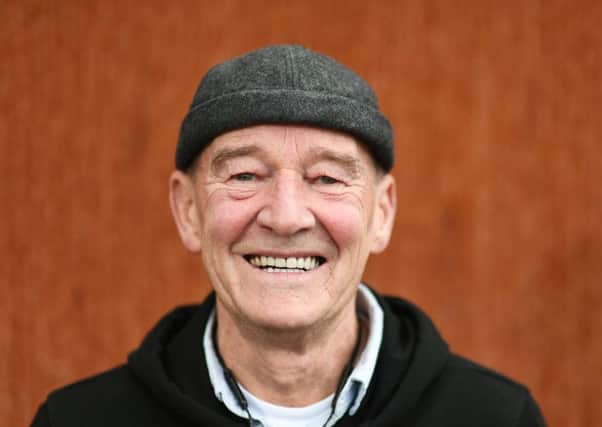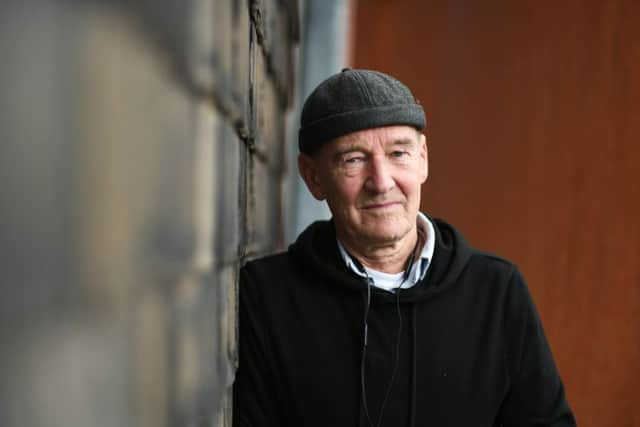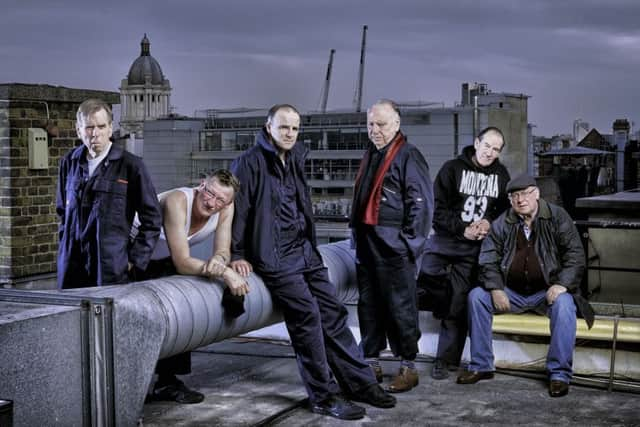David Hayman interview: The Hatton Garden heist, home and humanitarian aid


David Hayman slips into the Tramway in Glasgow, unassuming, anonymous in a grey felted wool beanie, black jeans, trainers and a hoodie. He could pass you in the street and you might not notice – in fact, he probably has as he walks miles every day in his native Glasgow. The result is a wiry, lithe frame that at 71 sees him doing his own stunts, most recently playing one of the Hatton Garden gang in the TV miniseries that starts on Monday, and screens over four consecutive nights.
“Doing your own stunts brings a credibility,” he says, “If you don’t, the audience notice almost imperceptibly, and there’s a lack of truth.”
Advertisement
Hide AdWhich is why Hayman squeezed through an exact replica of the 18 inch high hole into the vault.


“I was struggling, it was really tight – can you imagine Ray Winstone doing it for the film? He’s a big boy. He does, I’ve seen it, but they had to fake it,” he says, referring to The Hatton Garden Job, one of two films currently being made about the crime, such is the interest in the story of the £14 million safety deposit heist in the heart of London’s diamond district over the 2015 Easter weekend by a gang of six men with a combined age of 448.
You might not notice Hayman in the street, but he’s a familiar presence on our screens and stages. He laughs at the news that he’s going to grace the magazine cover – “with this face!” and grimaces – but it’s an expressive face, with keen blue eyes and a spare bone structure, that can flip from menace to compassion in a moment. “It’s the face I was born in, so that’s the face I’ve got,” he says.
It’s a face that fits from an acclaimed King Lear at the Citizens in 2012, to hard-bitten DCS Walker in ITV’s long-running Trial and Retribution. Films include Jimmy Boyle biopic A Sense of Freedom, Sid and Nancy, The Tailor of Panama with Pierce Brosnan, The Jackal with Bruce Willis, The Boy in the Striped Pajamas and more recently the comedy Finding Your Feet with Timothy Spall and Imelda Staunton. He has also directed, notably James McAvoy’s screen debut, The Near Room, as well as spending a decade in theatre direction in London.
Born in Bridgeton to a cleaner and electrician, Hayman was an apprentice in a steelyard when instead of catching his bus to work in Drumchapel, he walked into the Royal Scottish Academy of Music and Drama (now the Royal Conservatoire of Scotland) and told them he wanted to study acting.


“However I phrase this it’s a bit wanky,” he says, but perseveres. “I was crippled with shyness as a teenager, but found myself walking up the steps in my boilersuit, covered in engineering grease and iron filings. I burst through the registrar’s door, and a voice says, ‘I want to be an actor!’ There were only two people in the room, so it had to be me saying it. I didn’t really know where the voice was coming from. It was weird, something pulling me. I don’t remember it being a conscious decision, I just found myself there.”
Advertisement
Hide AdGraduating, he went straight to the Citizens Theatre and by 20 was playing Hamlet, and later Lady Macbeth too in a landmark all-male production, before his screen debut in A Sense of Freedom in 1979.
With a 50-year career behind him, he’s as busy as ever, and literally a perfect fit for Hatton Garden and the part of Daniel Jones, 61, the youngest gang member. “Yes, I aged down for this one,” he smiles.
Advertisement
Hide AdDramatised by Bafta-winning screenwriter Jeff Pope, it also stars Kenneth Cranham, Timothy Spall, Alex Norton, Brian F O’Byrne and Geoff Bell. “It was a cracking part and I loved the idea of going on a journey with that bunch of actors.”
Like many, Hayman remembers letting out a bit of a cheer when the heist hit the headlines.
“I thought, God, that’s amazing, the audacity of it. These old geezers manage to break into one of the most heavily fortified safety deposit boxes in the world, f*** it up the first night, go back again with another driller, finish the job, and get away with it. But then the daft buggers…” his voice drifts off, wary of spoilers, into a wheezy laugh, courtesy of the baccy pouch sitting on the table between us, and he wipes his nose with a bright red paisley bandana.
“Most guys their age are stood at the corner of the bar, drifting away, but not these ones. And no-one was injured. But they’re a bunch of gangsters and when you go into it, they’re all psychopaths. My character, Danny, seemingly went to bed wearing his granny’s goonie, wore a fez at night, locked his door at six o’clock because he was so institutionalised by prison, peed into a bottle and communicated with the dead. So they’ve all got their wee quirks.”
This TV version of the story focuses on the relationships among the gang members as much as the execution of the crime. “It’s the infighting – the others are a sort of jolly romp, but ours is very gritty, ugly. It’s men eating each other, taking chunks out of each other, through their greed. The POWER [he delivers the word in a whispered roar], the play… It’s very tense, has very deliberate pace, pulls you in. I think it’s quite compulsive.”
Also out this year is The Corrupted, again with old friend Timothy Spall, who he has directed on stage and on TV, and starring Sam Claflin, in a tale of corruption surrounding the London Olympics.
Advertisement
Hide Ad“It’s about illegal land deals and rip-offs, British gangsters, a sort of Long Good Friday. I play a cop,” he says.
Hayman is often cast as a cop or criminal – however, his other new film, Fisherman’s Friends, set in a Cornish fishing village, is a departure from type.
Advertisement
Hide Ad“It’s gentle, no sex, violence or swearing. It’s just about good people. Corrupted? They’re just arseholes, bad guys, so it’s nice to have the contrast.”
He loves comedy too and due out in the autumn, are three episodes of Dad’s Army. Of the 80 made, three were taped over, so UK TV has re-shot them in front of a live audience at Pinewood Studios.
“It was an absolute hoot to make, madly over the top,” he says.
“I played Private Frazer,” he informs me, unnecessarily, as he whips out his mobile and shows me a photo of his transformation, all whiskery eyebrows above gobstopper eyes.
“He’s demonic, “ he says and laughs.
At which point, I have to make him say it: “We’re all doo-oo-oo-oo-med.”
From Private Frazer to Lear, Malcolm McLaren, Jimmy Boyle, cops and hard men, Hayman has made a career of contrasts.
Advertisement
Hide Ad“Yeah, and I mix it up with my documentaries as well, which I love. The ones I did on slavery, Scotland’s Hidden Shame (BBC, 2018), I’m really proud of, and felt they were important. The one I made before that was about land reform, and I want to tackle sectarianism because I think it’s a blight on society.”
Sectarianism is a particular hate, having been banned from his Rangers-supporting grandad’s house for two years after singing Wild Rover with his brother at a gathering.
Advertisement
Hide Ad“He thought it was a rebel song. And that attitude is still here. For god’s sake, knuckle dragging, we’ve got to evolve! I LOVE watching football – why do you have to spoil it with racism and bigotry?”
Another area he’d like to shine a documentary light on is toxic masculinity, which he sees as widespread, from Donald Trump to Parliament to playgrounds.
“What’s that doing to our kids? Because I play a lot of hard men – with a face like mine, I don’t get other roles – if I’m in a position with toxic males who may respect me as a performer, maybe I’m the best person to say, ‘Oi! What the f*** are you doing? Go back home and beat the shit out of your wife ‘cos your team got beat – does that make you a man? I’d love to be able to really challenge them, use the language they use. See what reaction that gets.”
However, as much as Hayman loves his job, his real passion lies away from acting, in Spirit Aid, the humanitarian relief organisation he founded in 2001, to alleviate the suffering of children and young people affected by poverty, neglect, abuse, lack of opportunity, humanitarian crisis or war.
With operations in ten countries worldwide, starting in Scotland with community projects and Kiltwalk, and beyond in Palestine, Afghanistan and Malawi, it’s where Hayman spends time when he’s not acting – he’s been to Afghanistan nine times. Talking about it, his relaxed demeanour is replaced by a new air of urgency.
“In Afghanistan two out of every five children are dead before their fifth birthday,” he tells me. “The life expectancy of an adult in Afghanistan is 43 for men and 45 for women. It’s the same in Malawi.”
Advertisement
Hide AdSpirit Aid is the reason Hayman moved from directing back into acting, from London to Glasgow, to raise his three sons with Alice, a former social worker.
“I had just started Spirit Aid and had to create space in my life for it. As an actor if I’m involved in a movie it’s just five weeks. I don’t have three months prep and three months post-production.”
Advertisement
Hide AdSpirit Aid’s focus is on the young because as Hayman explains “they’re our future. My generation has created this hell of a mess that our children and young people have to inherit. There’s a brilliant Sioux nation philosophy that says, ‘We do not inherit the Earth from our ancestors, we borrow it from our children’. Your whole attitude has to change, otherwise I’m on my death bed saying to my three sons, ‘There you go guys, there’s the world, sorry it’s a pile of shite, we were too busy watching Strictly Come Dancing’. We can no longer do that. There is no longer any space for inertia.”
In addition to his sons, who work in Spirit Aid with him, there’s now his baby granddaughter, “a little nine-month-old lovebomb that has hit our lives, and I worry about what she’s going to inherit,” he says.
“We have to get off our arses and commit to creating a world we all say we’d like to live in and the world we all say we’d like to leave our children.”
Spirit Aid has mobile clinics in Afghanistan, looking after internally displaced people’s camps, and isolated mountain villages that hadn’t seen a doctor in 24 years. “The kids were dying,” he says. Malaria and gastro-intestinal diseases being the main cause, and respiratory infections rife in Afghanistan, all compounded by a lack of antibiotics and basic medicines.
In Palestine, Spirit Aid organises creative classes for children, “to help them deal with the fact their land is a prison”, while in Malawi the organisation feeds children at school, increasing attendance and qualifications. There are workshops where women can make clothes, learning skills and most importantly earning a wage.
There’s also Shooters, the filmmaking arm of Spirit Aid, clocking up more than 80 films in partnership with schools, prisons, homeless organisations and youth clubs, highlighting knife crime, mental health, addiction and sex trafficking, winning awards.
Advertisement
Hide AdAsk Hayman whether Spirit Aid is more important to him than acting and he doesn’t hesitate: The humanitarian work means more. Yet he prefers to hang in the background, hating the “white saviour” mentality – “you know, look at the white man keeping little black babies alive. I want to do it discreetly, kind of run away in a sense,” he says, still shy.
His compassion, he says, comes directly from his mother, “an angel barely disguised as a human being, always saw the best in people, fought on behalf of the underdog. I remember saying to her when I was six or seven, ‘Mum the world’s in a mess and it needs sorted. And I want to help to sort it.’ And she said, ‘Do ye son? Good for you.’
Advertisement
Hide Ad“Maybe I should have done that sooner, started earlier. Because it’s worthwhile. Entertainment is the opiate of the masses, acting’s just acting. It’s all me, me, me. And then, ‘That’s enough about me. Tell me what YOU thought of my performance.’” He laughs. “If I could find a sugar daddy with millions I’d be doing Spirit Aid full time.”
Or maybe he could just squeeze his way into a vault stuffed with millions of pounds. After all, we know he’s the perfect fit.
Hatton Garden starts on Monday at 9pm on ITV and screens for four consecutive nights
Spirit Aid; http://spiritaid.org/